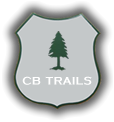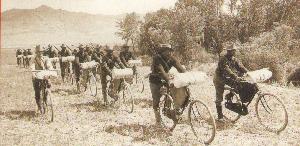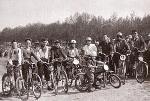The History of Mountain Biking
|
There’s a lot of history and information floating around about the origins of mountain biking, some that’s recognized and some that depends on who has the best public relations firm. Mountain biking would have happened somewhere and it did.
Did it begin with the Buffalo Soldiers, a turn-of-the-century infantry who customized bicycles to carry gear over rough terrain? It was August 1896, the riders, black enlisted men and a white lieutenant, rode from Missoula, Montana, to Yellowstone and back, an arduous trip. Their mission: to test the bicycle for military use in mountainous terrain.
|
|
|
Or was it the Velo Cross Club Parisien (VCCP) of France? Comprised of about 20 young bicyclists from the outskirts of Paris, who between 1951 and 1956 developed a sport that was remarkably akin to present-day mountain biking. These riders juiced up their French 650-B bikes with an extraordinary degree of technical sophistication.
|
|
Maybe it was John Finley Scott, who was probably the first mountain bike enthusiast in the United States. In 1953 he built what he called a “ Woodsie Bike”, using a Schwinn World diamond frame, balloon tires, flat handlebars, derailleur gears, and cantilever brakes. John was more than twenty years ahead of his time, and while he remained an off-road cycling enthusiast, at the time there were not many others who shared his passion. |
|
The Mountain Bike Hall of Fame believes that the inception of mountain biking needed to be a continuous series of events that connected with one another as opposed to an isolated incident. Another example, in the early 1970s there were a band of cyclists, The Cupertino Riders, aka. the Morrow Dirt Club, from Cupertino California, 75 miles south of Marin, who were modifying their bikes. They were grafting thumbshift-operated derailleurs and motorcycle lever-operated drum brakes to their klunkers to help them get up and down the south bay hills. They competed against some future hall-of-famers at a Marin County cylcecross race in late 1974, where their technology was noticed. Then they disappeared. |
|
|
We believe that the continuous history of the mountain bike is most evident in Northern California. There are a few areas that will claim to be the first mountain bike community, but every history book will lead you to Marin County. The origins of mountain biking were totally innocent. It came into being not as some faddist vision of profit-oriented marketing types, but rather as the product of true cycling enthusiasts trying to find something new to do on two wheels. These cyclists found through fun and competition that the old one-speed klunkers they were using could be improved with modern cycling technology. One thing led to another and mountain biking “the sport” was born.
For more information read:
Fat Tire, A Celebration of Mountain Biking
by Amici Designs
Richard’s Mountain Bike Book
by Charles Kelly and Nick Crane
The American Bicycle
by Jay Pridmore and Jim Hurd
Iron Riders-the Story of the Buffalo Soldiers Bicycle Corps
by George Niels Sorensen
The Birth of Dirt
by Frank J. Berto
|
|
|

 Crested Butte History
Crested Butte History 
















